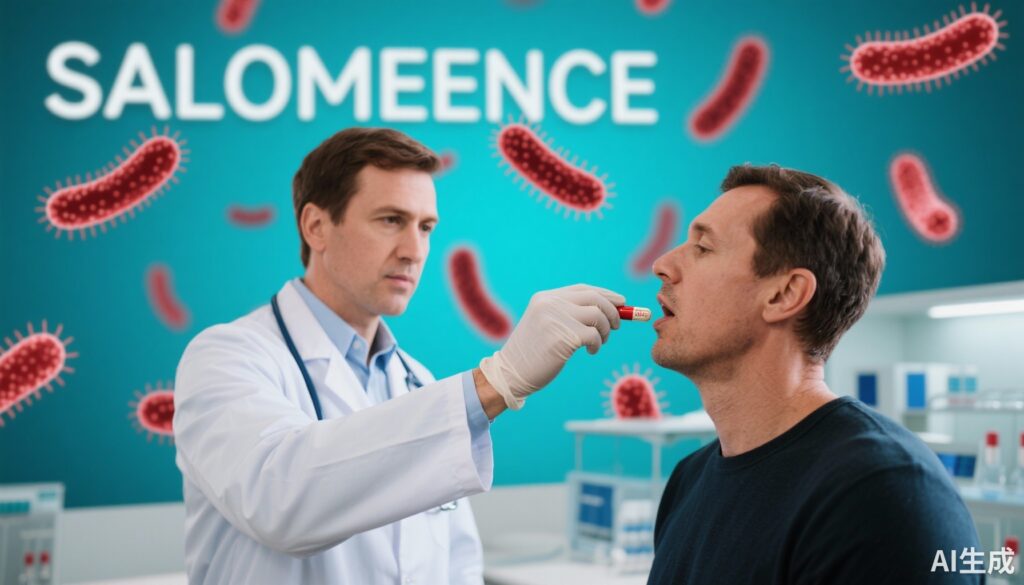Highlight
• Salmonella enterica serovar Paratyphi A causes over 2 million cases of enteric fever annually, with no prior licensed vaccines.
• The live attenuated oral vaccine CVD 1902 demonstrated a 73% efficacy in preventing S. Paratyphi A infection in a controlled human infection model.
• The vaccine elicited strong serum IgG and IgA responses to the O antigen without significant safety concerns.
• CVD 1902 represents a promising candidate to address the substantial unmet medical need in enteric fever prevention.
Study Background
Enteric fever, caused primarily by Salmonella enterica serovars Typhi and Paratyphi, remains a significant global health problem, particularly in Asia and Africa. While licensed vaccines for S. Typhi exist, no licensed vaccines target S. Paratyphi A, despite it accounting for a large proportion of enteric fever cases exceeding 2 million annually. The lack of effective preventative strategies against S. Paratyphi A contributes to the ongoing morbidity and mortality associated with enteric fever. This gap in vaccine availability underscores an urgent public health need for a safe and effective vaccine against S. Paratyphi A to reduce disease burden and transmission.
Study Design
This double-blind, randomized, placebo-controlled trial evaluated the safety, immunogenicity, and protective efficacy of CVD 1902, a live attenuated oral vaccine designed against S. Paratyphi A. Conducted in healthy adult volunteers in the United Kingdom, the study enrolled 72 participants randomized 1:1 to receive two oral doses of CVD 1902 or placebo spaced 14 days apart. Twenty-eight days after the second dose, participants underwent a controlled human infection with virulent S. Paratyphi A, providing a rigorous model to assess vaccine efficacy under tightly controlled conditions. The primary endpoint was the incidence of confirmed S. Paratyphi A infection within 14 days post-challenge. Secondary endpoints included safety assessments and measurement of vaccine-induced immunogenicity, specifically serum antibody responses.
Key Findings
Of the 72 participants randomized, 34 in the vaccine group and 36 in the placebo group completed the controlled challenge with S. Paratyphi A. Participants had a median age of 32 years, balanced by sex distribution (46% women). The safety profile was favorable; adverse event rates were similar between vaccine and placebo groups and no vaccine-related serious adverse events were reported.
Immunogenicity analyses revealed that two doses of CVD 1902 robustly induced serum IgG and IgA antibodies targeting the O antigen of S. Paratyphi A, while the placebo group exhibited no such increases. These results indicate effective stimulation of the host immune response by the vaccine.
Most importantly, vaccine efficacy against confirmed infection post-challenge was 73% (95% confidence interval [CI], 46–86) in the intention-to-treat population, with a similar estimate of 69% (95% CI, 42–84) in the per-protocol analysis. This demonstrates a substantial reduction in infection risk attributable to vaccination. The vaccine therefore conferred significant protection in a stringent human challenge model, underscoring its potential public health impact.
Expert Commentary
These findings represent a pivotal advancement in the prevention of enteric fever caused by S. Paratyphi A. The use of a controlled human infection model provides high-quality evidence for vaccine efficacy, a methodology increasingly recognized as a powerful tool in accelerating vaccine development. The induction of both IgG and IgA antibodies aligns with natural immune defenses at mucosal surfaces and systemic compartments, potentially contributing to the observed protection.
Notwithstanding these strengths, the study was limited to healthy adults in the UK, which may restrict generalizability to endemic regions with diverse populations, including children and immunocompromised individuals. Further studies in endemic settings are essential to confirm safety, immunogenicity, and effectiveness across broader demographics. Additionally, long-term durability of protection and potential impact on transmission dynamics warrant investigation.
Conclusion
The live attenuated oral vaccine CVD 1902 demonstrated a strong efficacy of approximately 73% against S. Paratyphi A infection in a well-controlled human challenge setting, with no safety concerns identified. Given the high global burden of enteric fever and absence of licensed S. Paratyphi A vaccines, CVD 1902 represents a promising candidate to fill this critical unmet medical need. These results support further clinical development and eventual deployment, potentially transforming enteric fever control and reducing disease burden worldwide.
Funding and Clinical Trials Registry
This study was funded by the Medical Research Council. The trial was registered at the VASP ISRCTN Registry under the number 15485902.
References
McCann N, Paganotti Vicentine M, Ebrahimi N, Greenland M, Angus B, Collins AM, Darton T, Emary K, Faust SN, Flaxman A, Maria N, Green CA, Juarez Molina C, Paidisetti R, Lazarus R, Macaulay GC, McLean F, Mohan VK, Naidu MG, Ramasamy MN, Rao DY, Singh N, Vernon S, Kim YC, Levine MM, Liu X, Pollard AJ; VASP Study Team. Safety, Efficacy, and Immunogenicity of a Salmonella Paratyphi A Vaccine. N Engl J Med. 2025 Oct 30;393(17):1704-1714. doi: 10.1056/NEJMoa2502992. PMID: 41160821.



